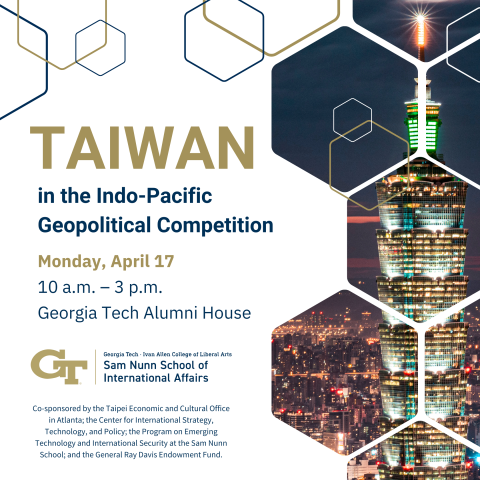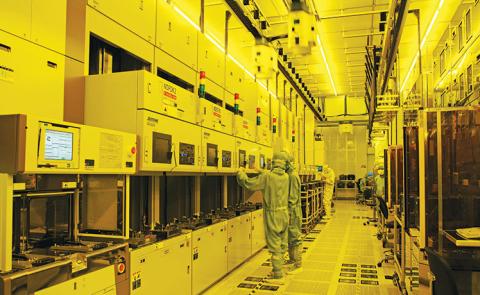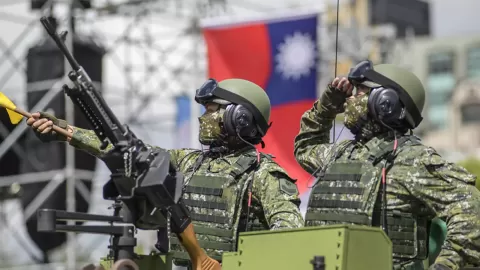event
Taiwan in the Indo-Pacific Geopolitical Competition
Primary tabs
Co-hosts: Taipei Economic and Cultural Office in Atlanta (TECO), Sam Nunn School of International Affairs (INTA), and Georgia Institute of Technology.
Taiwan has long occupied a critical position in the Indo-Pacific region. The island stands at the regional geostrategic and geoeconomic frontlines, challenging China’s regime legitimacy and hegemonic ambition, emerging as a tiger economy in the 20th century, and now securing its role as an advanced technology production powerhouse. Today, as the geopolitical competition between the United States and China heats up in the Indo-Pacific, Taiwan’s role has grown even more crucial while the island’s security circumstances have become ever more precarious.
To discuss these challenging conditions facing Taiwan and help chart a roadmap looking forward, this symposium brings together panelists, each an expert in their field, to create a nexus of thought and discussion on the topic.
The symposium covers two critical aspects of Taiwan’s role in the Indo-Pacific geopolitical competition. The first considers Taiwan’s central position in China’s geostrategic ambition and discusses how the world might ward off a Chinese invasion of the island. The panelists are top thought leaders and policy influencers in European and East Asian affairs and emerging technology’s war applications. The panel discussion will weave a synthesis of the implications of the current Ukraine war and emerging technology for China’s calculations and Taiwan’s deterrence.
The second panel will discuss Taiwan’s crucial position in the center of the tech war ramping up between the United States and China. In the age of AI and supercomputing in what some call the third industrial revolution, Taiwan dominates some of the tech sectors, above all the manufacturing of semiconductors, that will determine which great powers have the edge with access to the latest military and technological innovation possibilities. The panelists meet at the intersection between East Asian affairs and technology and industrial policy expertise to discuss the challenges and opportunities for Taiwan amid the rising U.S. export restrictions and unfolding tech competition.
Related Links
____________________________________________________________________________________________________________________________________________________________________________________
Agenda (Coffee and light refreshment will be provided throughout the symposium)
10 a.m. – 10:10 a.m. Opening remarks
TECO Director General Elliot Wang and Sam Nunn School of International Affairs Chair and Professor Adam Stulberg
10:10 a.m. – 11 a.m. Keynote Speech: Why Taiwan Matters? By Shelley Rigger
Shelley Rigger (Davidson College, Professor)
Rigger is the Brown Professor of Asian Studies and the Vice President for Academic Affairs and Dean of Faculty at Davidson College. Her research interests are Taiwanese politics and U.S.-China-Taiwan relations. She previously was a Fulbright scholar at National Taiwan University in Taipei and has held visiting professor and researcher positions at universities in China and Taiwan. She is a non-resident fellow of the China Policy Institute at Nottingham University and a senior fellow of the Foreign Policy Research Institute.
11 a.m. – 12:30 p.m. Panel 1: How to Prevent a Taiwan War? Lessons from Ukraine and Beyond
Moderator: The Honorable Michele Flournoy (INTA, Distinguished Professor of the Practice)
Flournoy is the former Under Secretary of Defense for Policy under President Barack Obama and the Deputy Assistant Secretary of Defense for Strategy under President Bill Clinton. Additionally, she is the co-founder of the Center for a New American Security and the co-founder and current managing partner of WestExec Advisors. A distinguished defense policy advisor, she was one of the top candidates for President Biden’s choice for the Secretary of Defense in 2020.
Panelists:
General Phil Breedlove (INTA, Distinguished Professor of the Practice)
General Breedlove is the former NATO Supreme Allied Commander Europe and US European Command Commander. He is currently an Atlantic Council Director and led a delegation to Taiwan which was received by President Tsai in 2018. As the U.S. Air Force Commander at Luke AFB, he helped train Taiwan’s air force wings. He is also a Center for European and Transatlantic Studies Senior Fellow and a Distinguished Professor of the Practice at the Sam Nunn School of International Affairs.
Robert Bell (INTA, Distinguished Professor of the Practice)
Bell is a Distinguished Professor of the Practice at the Sam Nunn School of International Affairs and CEO of National Security Counsel consulting firm. During his career, Bell has worked with the U.S. Air Force, the Senate Committees on Foreign Relations and Armed Services, and NATO. Amongst many other positions, Bell previously served as the senior civilian representative of the Secretary of Defense in Europe and the Defense Advisor to the U.S. Ambassador to NATO from 2010-17.
Adam Stulberg (INTA, Chair and Professor)
Stulberg is a professor and Chair of the Sam Nunn School of International Affairs. His wide array of research interests includes the geopolitics of oil and gas networks, energy security dilemmas and statecraft in Eurasia, Russia and "gray zone" conflicts, and new approaches to strategic stability, among others. Some of Stulberg’s many previous roles include political consultant at RAND, senior research associate at the Center for Nonproliferation Studies, and consultant to the Office of Net Assessment, Office of the U.S. Secretary of Defense. He has worked closely with former Senator Sam Nunn drafting policy recommendations and background studies on future directions for the U.S. Cooperative Threat Reduction Program
Jon Lindsay (INTA and School of Cybersecurity and Privacy, Associate Professor)
Lindsay is an associate professor at the Sam Nunn School and the School of Cybersecurity and Privacy. He is the leading voice in researching cybersecurity, intelligence studies, deterrence in the modern era, and the sociology of technology. He has published numerous books and papers on the subjects, including Cross-Domain Deterrence: Strategy in an Era of Complexity (Oxford University Press, 2019) with Erik Gartzke and China and Cybersecurity: Espionage, Strategy, and Politics in the Digital Domain (Oxford University Press, 2015) with Tai Ming Cheung and Derek Reveron, among others.
12:30 – 1:30 p.m. Lunch (With the expectation that panel one’s Q&A could continue during lunch time)
1:30 – 3 p.m. Panel 2: Taiwan’s Crucial Role at the Center of the U.S.-China Tech War
Moderator: Alasdair Young (INTA, Professor and Neal Family Chair)
Young is a professor at the Sam Nunn School, where he is also the Neal Family Chair and co-director of the Center for European and Transatlantic Studies and the Center for International Strategy, Technology, and Policy. He was previously the co-editor of JCMS: Journal of Common Market Studies and chair of the European Union Studies Association. His main research interest is international political economy, and he has performed consultancy work for the U.S. and U.K. governments and the European Commission.
Panelists:
John Krige (HSOC, Professor Emeritus)
Krige is a Professor Emeritus at the School of History and Sociology at the Georgia Institute of Technology. He is the recipient of the 2020 Francis Bacon Award in the History and Philosophy of Science and Technology, recognizing his continued and substantial impact on the history of science, technology, and the historically-engaged philosophy of science. His research examines the intersection between science, technology, and foreign policy, with specific interests in the Cold War and space technology collaboration. His most recent co-authored book, Knowledge Regulation and National Security in Postwar America, speaks directly to the ongoing U.S. bans on tech exports to China amid the Indo-Pacific geopolitical competition.
Fei-ling Wang (INTA, Professor)
Wang is a professor at the Sam Nunn School. His research interests are comparative and international political economy, U.S.-East Asian relations, and East Asia and China studies. He has published eight books (two co-edited) in two languages, including Organization through Division and Exclusion: China's Hukou System (Stanford University Press. 2005), The China Order: Centralia, World Empire, and the Nature of Chinese Power (SUNY Press, 2017), and The China Record: An Assessment of the People's Republic (SUNY Press, 2023). He previously taught at the U.S. Military Academy and U.S. Air Force Academy and has held visiting and adjunct positions at several universities worldwide, including National Sun Yat-sen University and National Taiwan University in Taiwan. He is also a member of the Council on Foreign Relations.
Daniel Aum (INTA, Ph.D. Candidate)
Daniel Aum is a Ph.D. candidate in International Affairs, Science, and Technology. Among other roles, he previously served as a Harold Rosenthal Fellow with the U.S. House Foreign Affairs Committee and the Subcommittee on Asia, the Pacific, Central Asia, and Nonproliferation.
Jared Morgan McKinney (Air War College, Assistant Professor)
McKinney is an assistant professor of international security at Air War College. Before coming to Air War College, McKinney was Chair, Strategy and Security Studies, at the Global College of PME, Air University. McKinney completed his Ph.D. at the S Rajaratnam School of International Studies, Singapore, and holds master's degrees from Missouri State University, Peking University, and the London School of Economics. He has published peer-reviewed essays in the Journal of Contemporary China, Journal of Strategic Studies, and Third World Quarterly and is the co-editor of Chinese Regionalism in Asia: Beyond the Belt and Road Initiative (Routledge, 2022). McKinney was the Outstanding Airman of the Year, Civilian Supervisory Category IV, for Air Education and Training Command in 2022.
Prof. Jacques deLisle (University of Pennsylvania, Professor)
DeLisle is a political science and law professor at the University of Pennsylvania, where he also serves as the director of the Center for the Study of Contemporary China, co-director of the Center for Asian Law, and director of the Asia Program at the Foreign Policy Research Institute. His research and teaching interests include Chinese law and politics, China and the international order, cross-Taiwan Strait relations, and US-China relations. In addition, he frequently serves as an expert witness on issues of PRC law and government policies.
Format
The symposium will use a hybrid format with in-person and virtual components. The symposium will be broadcasted and recorded synchronously via YouTube, enabling real-time interactions with virtual participants and continuing availability post the event. In addition, the event’s webpage will serve as a lasting reservoir of public knowledge for people interested in the topics.
____________________________________________________________________________________________________________________________________________________________________________________
Directions & Parking
From I-75/85 North:
- Take Exit #249D (Spring Street, West Peachtree Street).
- At the top of the exit ramp, go through the first intersection (Spring Street).
- At the next intersection (West Peachtree), turn left.
- Continue on West Peachtree for approximately one block and turn left onto North Avenue.
- Cross over the interstate and Techwood Drive.
- On the left you will come to a large parking lot called Visitor 1 Lot. Simply pull to the gate (on the left once inside the lot) and take a ticket.
From I-75/85 South:
- Take Exit #249D (North Avenue).
- At the top of the exit ramp, turn right onto North Ave.
- Continue on North Ave. approximately 1.5 blocks through the traffic light at Techwood Drive.
- On the left you will come to a large parking lot called Visitor 1 Lot. Simply pull to the Visitor 1 gate (on the left once inside the lot) and take a ticket.
____________________________________________________________________________________________________________________________________________________________________________________
Supplemental Readings
Background
- Linkedin- Taiwan Security Issues
- Adam P. Liff and Dalton Lin, “The ‘One China’ Framework at 50 (1972–2022): The Myth of “Consensus” and Its Evolving Policy Significance,” The China Quarterly 252, pp. 977-1000.
- Dalton Lin, “‘One China’ and the Cross-Taiwan Strait Commitment Problem,” The China Quarterly 252, pp. 1094-1116.
- Richard Haass and David Sacks, “American Support for Taiwan Must Be Unambiguous,” Foreign Affairs, September 2, 2020.
- Bonnie S. Glaser; Michael J. Mazarr; Michael J. Glennon; Richard Hass and David Sacks, “Dire Straits,” Foreign Affairs, September 24, 2020.
- Dr. Dalton Lin on the Triangular Security Dynamics between Beijing, Taipei, and Washington | U.S.-China Perception Monitor
- Jessica Chen Weiss, “Don’t Panic about Taiwan” in Foreign Affairs
- Richard C. Bush, “Difficult Choices”, CAPRI Foundation
- Shelley Rigger, "Why Taiwan Matters: Small Island Global Powerhouse"
Panel 1: How to Prevent a Taiwan War? Lessons from Ukraine and Beyond
- "America's Indo-Pacific Strategy Runs Through Ukraine," in War on the Rocks (Texas National Security Review), by Luis Simon, December 16, 2022
- "CSIS Commission on the Korean Peninsula: Recommendations on North Korea Policy and Extended Deterrence," Project Director: Victor D. Cha, Co-Chairs: John J. Hamre and Joseph S. Nye, Jr., CSIS, January 2023.
Panel 2: Taiwan’s Crucial Role at the Center of the U.S.-China Tech War
-
Tiger Technology: The Creation of a Semiconductor Industry in East Asia (2007) by John Matthews and Dong-Sung Cho
-
Chip War: The Fight for the World's Most Critical Technology (2022) by Chris Miller
Status
- Workflow status: Published
- Created by: cwhittle9
- Created: 03/21/2023
- Modified By: cwhittle9
- Modified: 05/08/2023
Categories
Keywords
User Data
Target Audience



